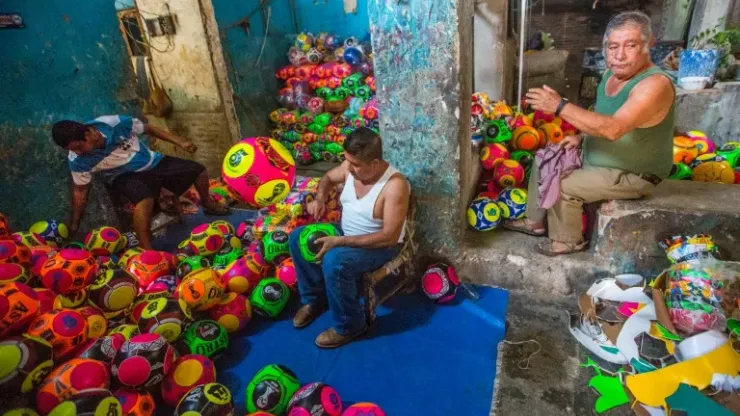Chichihualco (Mexico) (AFP) – A shirtless man sits under a tree in a town in southern Mexico, stitching together a football. At the central square, several women congregate to make balls for the national pastime.
Others toil in workshops or inside their ramshackle homes: A grandmother sewing on a chair in her dirt-floor home, or a pregnant woman pulling threads in her kitchen while her six-year-old niece hands her panels of synthetic leather.
Hundreds work like this in Chichihualco, a town famous for hand-stitching colorful footballs for over 50 years in the mountains of the impoverished state of Guerrero.
In its heyday, Chichihualco made the balls that were kicked around on the pitches of Mexico’s first division clubs, and those used by the national team.
But competition from Asia, emigration to the United States and drug trafficking have relegated Chichihualco’s footballs to amateur recreational sales.
Mexico’s national squad, meanwhile, is using Adidas balls during practice for this month’s Copa America Centenario tournament in the United States.
Despite Chichihualco’s losing streak, entire families in the community of 25,000 people continue the tradition that they inherited from their parents and grandparents.
“All of us sew balls. Men, women, children. Even my husband. There’s no other work,” said Virginia Ramirez, 72, as she stitched together segments of vinyl in her small house with a dirt floor.
Ramirez has been making footballs since age 17. She has been doing this for so long that she doesn’t need a thimble to protect her leathery hands from the needle.
She earns 10 pesos (50 US cents) per ball and can make up to five per day.
“We are very poor. We don’t have beans or salt. We have nothing,” she said under a roof made of wood planks.
– ‘Can’t compete’ with Asia –
The first workshop in Chichihualco appeared in the 1960s, when a man named Eulalio Alarcon brought ball segments from Mexico City to have them stitched together.
Others in the community were inspired and 70 workshops opened, churning out 60,000 balls per month, said Mayor Alfredo Alarcon, who owns a football-making facility and is not related to Eulalio.
But today there are only 15 workshops and production has dropped to 15,000 balls per month, he said.
The workshops have machines to make and cut the synthetic leather into panels, which are then sewn together by villagers in their homes.
The balls then go back to the workshops, where they are pumped full of air and finishing touches are applied.
Alberto Morales, who opened his factory in the 1960s, stared recently at the 1,200 balls that his facility produces every week.
They come in hot red, shiny black or lime green and each sell for $3 to $5, leaving Morales with an eight-cent profit per ball.
His company remains afloat despite competition from cheaper balls made in China and Pakistan, but things used to be better.
“We are stuck. We can’t produce more because we can’t reinvest in material or machines,” Morales said as he held one of the 200 balls that first division club Tigres of Monterrey ordered for its fans.
“We could compete with balls from anywhere in the world. Our ball is really spherical, sewn by hand, while the Chinese ones go all over the place when you kick them,” he said.
Fewer people are making footballs than before, as they can find more lucrative work than 10 pesos per ball.
The drug trade has become an option in a region known as the country’s top producer of opium poppies.
“Some people don’t want to sew anymore. They prefer to cultivate poppies in the mountains. They earn more,” said Arturo Alarcon, a distant cousin of the mayor who runs a workshop that makes fluorescent balls.
– 17 bodies –
Chichihualco has not escaped the pressure of drug cartels that have spread fear across Guerrero, which had the highest murder rate among states in Mexico last year, with 56.5 homicides per 100,000 people.
In December, 17 bodies were discovered at the bottom of a ravine, including eight that were burned.
The labor force has also dwindled due to migration to the United States. Alarcon estimates that 70 percent of the town has gone across the border and sends money back home, fueling much of Chichihualco’s economy.
Workshops have outsourced some of the work to surrounding communities and even a local prison, where inmates produce 5,000 balls per week.
“The boys (prisoners) put work into it. It helps them to not think about bad things,” Arturo Alarcon said as he sat amid dozens of balls, some painted with the face of Spider-Man or the words “FIFA World Cup Brasil.”
Some 40 families sew balls in Chichihualco and another 200 do the work in surrounding communities.
“Ten pesos per ball isn’t much, right?” said Erasmo Flores, a 43-year-old-farmer and musician who has been sewing balls since the age of six.
“It’s not enough to get lunch. One eats what God gives him,” said Flores, who has a heart tattooed on his arm, as he made his second football of the day while sitting under a tree in front of his house.
200+ Channels With Sports & News
- Starting price: $33/mo. for fubo Latino Package
- Watch Premier League, Women’s World Cup, Euro 2024 & Gold Cup
The New Home of MLS
- Price: $14.99/mo. for MLS Season Pass
- Watch every MLS game including playoffs & Leagues Cup
Many Sports & ESPN Originals
- Price: $10.99/mo. (or get ESPN+, Hulu & Disney+ for $14.99/mo.)
- Features Bundesliga, LaLiga, Championship, & FA Cup
2,000+ soccer games per year
- Price: $5.99/mo
- Features Champions League, Serie A, Europa League & Brasileirāo
175 Premier League Games & PL TV
- Starting price: $5.99/mo. for Peacock Premium
- Watch 175 exclusive EPL games per season






